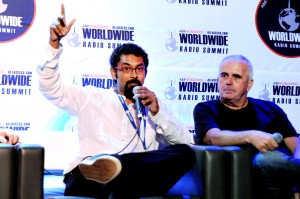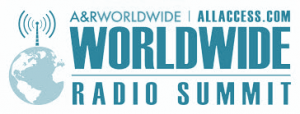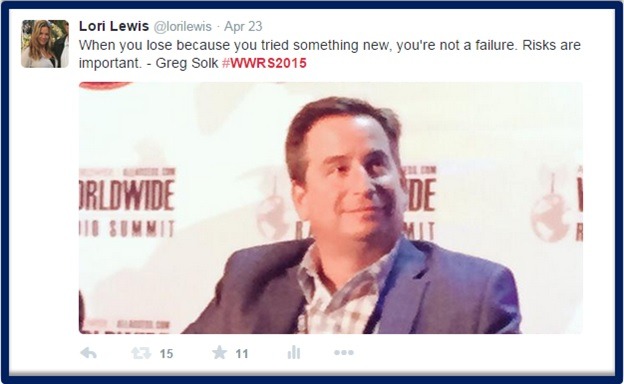Last week at the Worldwide Radio Summit in L.A., there were truly some amazing panels. As someone who has been to all five of these conferences since 2011, it is fascinating to watch how this conference has evolved.
 WWRS’s opening session featured an unambitious, low-key title: “The Future of Radio.” Amazingly, it actually delivered on that promise. The panel was stacked with smart, media experts who exuded honesty, transparency, and graciousness. Sometimes when CEOs take the stage, it’s full of hyperbole, talking points, the company line, and not a lot of truth. This panel was different. Hosted by Paul Jacobs, Tim Westergren (Pandora), Ben Cooper (BBC), David Taylor (Panasonic), Neal Schore (Triton), Jeff Smulyan (Emmis), and Anthony Bay (Rdio), this session was memorable, content-rich, and it set the tone for the rest of WWRS.
WWRS’s opening session featured an unambitious, low-key title: “The Future of Radio.” Amazingly, it actually delivered on that promise. The panel was stacked with smart, media experts who exuded honesty, transparency, and graciousness. Sometimes when CEOs take the stage, it’s full of hyperbole, talking points, the company line, and not a lot of truth. This panel was different. Hosted by Paul Jacobs, Tim Westergren (Pandora), Ben Cooper (BBC), David Taylor (Panasonic), Neal Schore (Triton), Jeff Smulyan (Emmis), and Anthony Bay (Rdio), this session was memorable, content-rich, and it set the tone for the rest of WWRS.
Everyone had great presence and wonderful insights, but the audience was struck by the perceptiveness and cleverness to the representative from the UK, Ben Cooper. And that’s when I started thinking back to how the “world” in the name Worldwide Radio Summit is becoming more important each year.
At last year’s conference, there was “a global moment” – and we wrote about it in this blog – when Australia’s Southern Cross Austereo’s Guy Dobson told the room that American radio was no longer a shining beacon for broadcasters around the world. Guy courageously chided his U.S. colleagues by reminding them that radio people from Europe and Asia no longer perceive the value in coming to America to hear our radio stations.
At this year’s WWRS, there wasn’t an international incident. But several broadcasters from overseas made their presence known and contributed in a significant way to the conversation. The aforementioned Ben Cooper reminded the room that while “local” is an oft-used term to describe one of radio’s inherent benefits, a better term for it may be “community.” And he went on to point out that communities of consumers aren’t bound by geographic barriers or metro definitions from Nielsen.

Photo credit: KC Morse
And later the same day, a panel called “Programming the Intangibles” explored the relationship between science and emotion – a radio debate that has raged for decades. American broadcasters were represented by Mike McVay (Cumulus), Rob Cressman (iHeartMedia), and Greg Solk (Hubbard).
And globally, it was Manuel Sanguinetti, PD of Radio Doble Nueve (Peru), and Anil Machado, head programmer of Radio One/India.
It was an amazing contrast of styles. As moderator Marc Chase pointed out mid-session, you could feel the programming passion flowing out of Manuel and Anil. These guys are emotional PDs who depend on their gut feelings, their instincts, and their native knowledge to make key decisions. Neither is a fan of or has access to much in the way of research data.
On the other side, the American broadcasters exuded a greater sense of control, discipline, and staying with the plan. Solk noted that in the war of art versus science, he tends toward the former. And he expressed gratitude for other smart Hubbard programmers who bring more science to their craft.
It should be noted that when Solk signed on The Drive in Chicago, it was very much that gut-driven passion play that Machado and Sanguinetti talked about. The music was hand-selected to fit a new form of Chicago rock radio. Between Solk’s knowledge of Chicago, the competitive climate, and his feel for the music, WDRV has had an amazing run in the nation’s third largest market.
Ben Cooper reminded everyone in that first panel that in the UK, it’s a small radio community where a handful of players who can But especially for companies that own hundreds of stations, how do you control the emotional programming ideas that emanate from scores of programmers and jocks?
Oftentimes, it comes down to balancing out the risks. And in speaking about a rough start in Los Angeles at KSWD seven years ago that’s turned into a bona fide major market success, Greg put his philosophy out there:
So risk is a factor, but it’s also about two other R’s – reaction and real-time.
The ability to be able to pivot and respond to what’s happening in your market, whether it’s Minneapolis or Mumbai, got me thinking about a comment on this blog the other day about our recent “Format Killers” post. Dave Howard aka “Dave In The Cave” who programs and hosts the morning show on K101.7 in Killeen, TX, had this to say:
“Sometimes it’s as simple as the morning where snow came out of nowhere and we played “Let it Snow” by Dean Martin. I imagined in my mind all of us sharing this moment as a community, tied together by this on the silly, very on-the-nose musical choice. Facebook and phone calls and a sarcastic remark from the PD were the icing on the cake.”
But when you’re tethered to rigidly following the music test and then scheduling music by the book, these moments can be lost. It’s times like these when I think about whether Andy Economos, the father of Selector, intended for his brainchild to be used in this way.
It comes down to knowing your market and your audience, and not letting the science sabotage the emotion. At that WWRS panel, Manuel talked about simply knowing the music his audience wants – because he knows his audience.
And Anil told the room that in India, they do “people research,” not “music research.” He talked about how his stations send staffers around town to observe people in their everyday lives, going to work, taking the bus, shopping on the streets, and just hanging out.
At one point, he explained his station’s programming strategy where every day of the week features a different genre of music. One day, it’s Pop Hits, another it’s EDM, another day it’s Blues, and so on. He turned to the room and asked, “So you tell me – what format am I running?”
 And that goes to the heart of that balance, because knowing your market, understanding the culture of the local environs, and having a sense for what might be missing isn’t always apparent in the research or obvious when you’re a company running hundreds of radio stations.
And that goes to the heart of that balance, because knowing your market, understanding the culture of the local environs, and having a sense for what might be missing isn’t always apparent in the research or obvious when you’re a company running hundreds of radio stations.
It involves emotionally connecting with an audience, something that can be obscured by the metrics, the research, and the tools. Another international broadcaster, Pawel Jawor, who programs Polish Radio Bialystok, posted a blog comment here that explained how it often comes down to radio’s ability to simply “put a smile on people’s faces.”
Solk acknowledged that most radio stations in those 48 PPM markets overreacted to the new technology, cutting back on talk, spontaneity, and pretty much everything. To an extent, many in the business have readjusted their meter philosophies, something that has become more important as the media world now includes more diverse competition coming from a wide variety of sources.
The panel was a reminder about just how much radio broadcasters can learn from each other. And this conference continues to be evidence that what was once a clash of the cultures is now an opportunity to innovate and instill more passion and emotion into radio programming.
Program local. Think global.
- The Exponential Value of Nurturing Radio Superfans - April 28, 2025
- What To Do If Your Radio Station Goes Through A Midlife Crisis - April 25, 2025
- A 2020 Lesson?It Could All Be Gone In A Flash - April 24, 2025





Thanks Fred for your very kind words. There were a lot of great moments at WWRS 2015, and I appreciate you sharing them. — Joel
Right back at you, Joel. We appreciate being a part of this great event.
Thank you for quoting me. If I could add something to the words: “put a smile on people’s faces”…
“Make ‘Em Laugh”. Who don’t remember that song from famous musical “Rain song”. It was singing by comedian Donald O’Connor.
A week ago I was on a course of neurolinguistics. It was a very enlightening experience… It dawned on me that sad and unhappy people are the driving economic force.
People simply don’t buy a computers, tablets, or Coca-Cola. They’re buying a better life. Big companies(for example Apple) do not advertise their products… They advertise a happier lifestyle.
If we are working in a radio, it is very important to know and understood that truth. Like it is in song:
And in the immortal words of That buddy
Samuel J. Snodgrass, as he was about to be lead
To the guillotine:
Make ’em laugh!
Make ’em laugh!
Do not you know everyone wants to laugh?
Make ’em laugh. Not because we need a money (although it is also important) … But because we are for others. As it wrote the famous Polish poet Maria Konopnicka:
“And when your heart will be overwhelmed by the thought that life is not worth living ,
You should wipe the tears from people’s eyes, even if no one wiped the tears from your eyes.”
The specialist in neurolinguistics told me that in first moment people always pay attention on the eyes. Despite the fact, that in an advertisement, there is a half-naked woman or man.
I was wondering for a long time, what are the “eyes” in radio? I have come to the conclusion that the “eyes” means “truth”. Truth means also honesty, to be yourself. It attracts people to the radio. Listeners want to have a friendly relationship with radio personalities.
I’m laughing, I’m laughing. Thanks, Pawel!